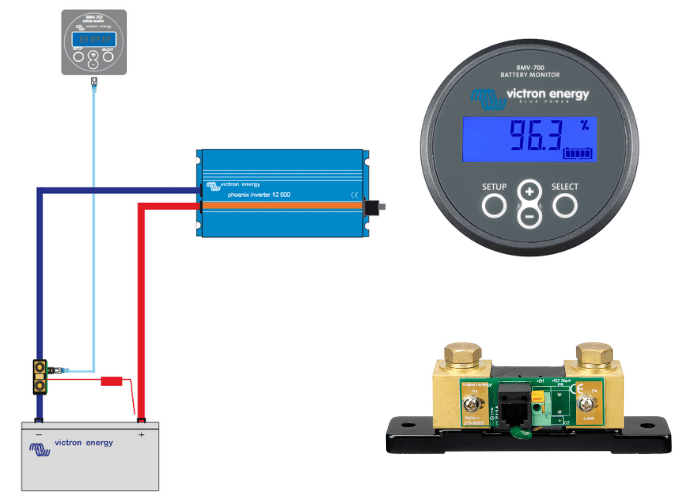A Battery Management System (BMS) often uses a device called a hall effect sensor to measure the current flowing in and out of your battery.
This sensor is crucial because it helps the BMS monitor how the battery is being used and ensure it operates safely. However, hall effect sensors have a limitation: they’re not very accurate at measuring low currents.
This means that when the battery is being used lightly or is nearly full, the BMS might not give a precise reading of the battery’s state of charge (SoC), which is a measure of how much energy is left in the battery.
Reasons why you don’t need one
If your BMS has Bluetooth connectivity and provides a SoC indication, and you’re okay with a general idea of how much charge your battery has, then you might not need anything else. This setup can be sufficient for everyday use where pinpoint accuracy isn’t critical.
If your system is grid-tied, and your battery can charge from the grid, then you don’t need a shunt.
In my home, I have a small backup power system and I don’t need to know the battery % because it will be full most of the time. The inverter is Victron, and it will estimate the % of the battery based on voltage.
Reasons why you need one
But, if you need to know exactly how much charge your battery has at all times, especially if you rely on your battery for important tasks or it’s part of a larger system, then a shunt might be necessary.
A shunt is a device specifically designed for accurate current measurement. It can give you a much more precise reading of your battery’s state of charge, ensuring you know exactly how much energy you have available at any given time.
So, if accuracy is critical for your needs, investing in a shunt alongside your BMS is a smart choice.
If you have a Victron VRM system, then you might want to integrate the battery readings in the system which makes it more complete.

Read my buying guide on the best battery monitors if you want to know my recommended shunts.

I’m an off-grid enthusiast. I created this website to give clear and straight-to-the-point advice about solar power. I’m also the author of the book ‘Off-grid solar power simplified‘. Read more about me on my about page, check out my Youtube channel, or send me a message.
This is great, came across your website, and i love the way the solar calculator helps in calculating the battery sizes, and also the Required Solar Panels To Charge The Battery.
Glad you like it!